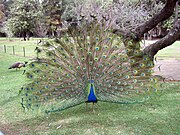Introduction to Psychology 1/IPSY103/Introduction
| “ | In the distant future I see open fields for far more important researches. Psychology will be based on a new foundation, that of the necessary acquirement of each mental power and capacity by gradation. Light will be thrown on the origin of man and his history. | ” |
| —Charles Darwin, On the Origin of Species by Means of Natural Selection | ||
Natural selection theory, and the related sexual selection theory, explain how evolutionary change happens. Discovered independently by Charles Darwin and Alfred Russel Wallace, it describes the conditions under which all organisms--bacteria, bats, and blue whales--evolve. Natural selection requires Variation, inheritance, selection, and time in order to produce adaptations (or "designs"). These components can be remembered using the acronym: VISITED: Variation + Inheritance + Selection + in Time Equals Design. The video, "Evolution Explained in 4 Minutes" introduces the "VISITED" acronym: https://youtu.be/lii2x6Nk8Bg
Evolution or change over time occurs through the processes of natural and sexual selection. In response to problems in our environment, we adapt both physically and psychologically to ensure our survival and reproduction. Sexual selection theory describes how evolution has shaped us to provide a mating advantage rather than just a survival advantage and occurs through two distinct pathways: intrasexual competition and intersexual selection. Gene selection theory, the modern explanation behind evolutionary biology, occurs through the desire for gene replication. Evolutionary psychology connects evolutionary principles with modern psychology and focuses primarily on psychological adaptations: changes in the way we think in order to improve our survival. Two major evolutionary psychological theories are described: Sexual strategies theory describes the psychology of human mating strategies and the ways in which women and men differ in those strategies. Error management theory describes the evolution of biases in the way we think about everything.
If you have ever been on a first date, you’re probably familiar with the anxiety of trying to figure out what clothes to wear or what perfume or cologne to put on. In fact, you may even consider flossing your teeth for the first time all year. When considering why you put in all this work, you probably recognize that you’re doing it to impress the other person. But how did you learn these particular behaviors? Where did you get the idea that a first date should be at a nice restaurant or someplace unique? It is possible that we have been taught these behaviors by observing others. It is also possible, however, that these behaviors—the fancy clothes, the expensive restaurant—are biologically programmed into us. That is, just as peacocks display their feathers to show how attractive they are, or some lizards do push-ups to show how strong they are, when we style our hair or bring a gift to a date, we’re trying to communicate to the other person: “Hey, I’m a good mate! Choose me! Choose me!"
However, we all know that our ancestors hundreds of thousands of years ago weren’t driving sports cars or wearing designer clothes to attract mates. So how could someone ever say that such behaviors are “biologically programmed” into us? Well, even though our ancestors might not have been doing these specific actions, these behaviors are the result of the same driving force: the powerful influence of evolution. Yes, evolution—certain traits and behaviors developing over time because they are advantageous to our survival. In the case of dating, doing something like offering a gift might represent more than a nice gesture. Just as chimpanzees will give food to mates to show they can provide for them, when you offer gifts to your dates, you are communicating that you have the money or “resources” to help take care of them. And even though the person receiving the gift may not realize it, the same evolutionary forces are influencing his or her behavior as well. The receiver of the gift evaluates not only the gift but also the gift-giver's clothes, physical appearance, and many other qualities, to determine whether the individual is a suitable mate. But because these evolutionary processes are hardwired into us, it is easy to overlook their influence.
To broaden your understanding of evolutionary processes, this module will present some of the most important elements of evolution as they impact psychology. Evolutionary theory helps us piece together the story of how we humans have prospered. It also helps to explain why we behave as we do on a daily basis in our modern world: why we bring gifts on dates, why we get jealous, why we crave our favorite foods, why we protect our children, and so on. Evolution may seem like a historical concept that applies only to our ancient ancestors but, in truth, it is still very much a part of our modern daily lives.
